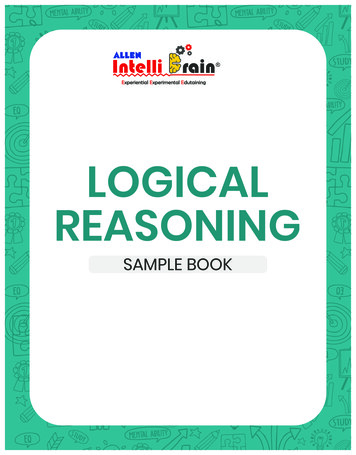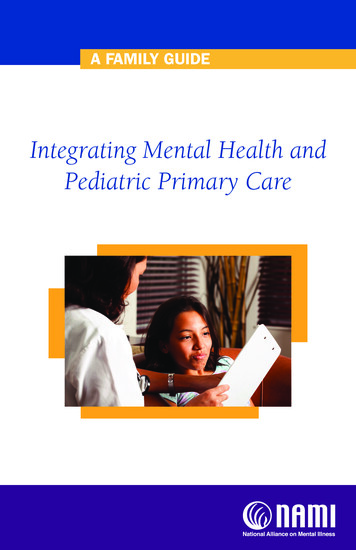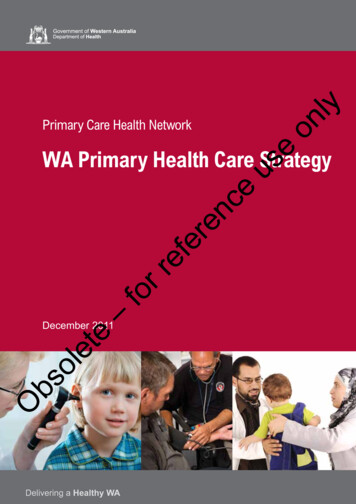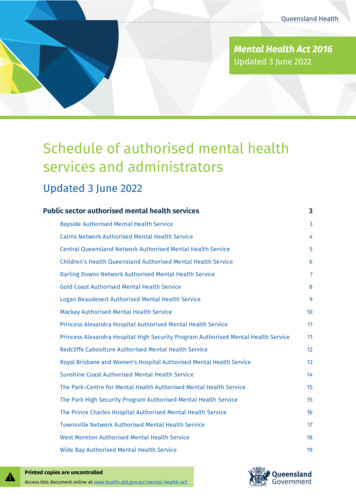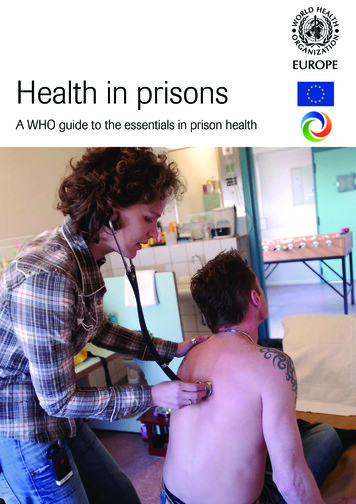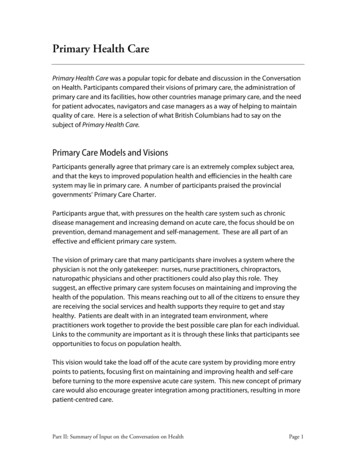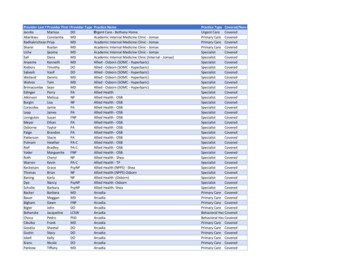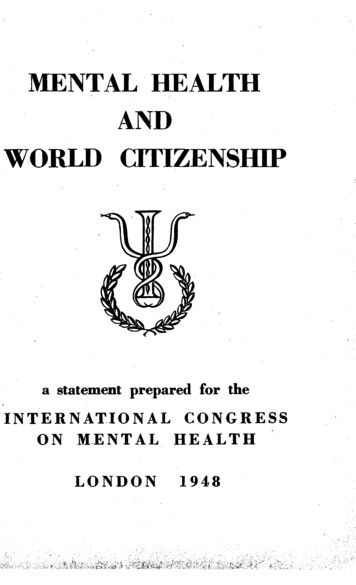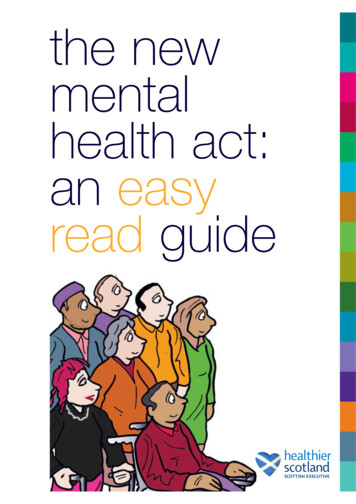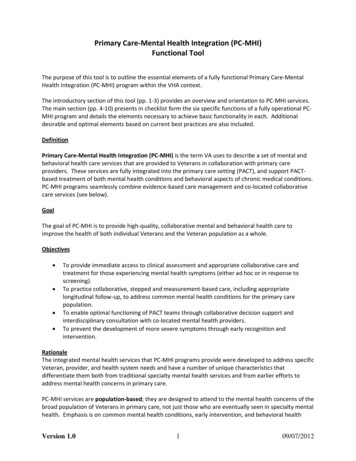
Transcription
Primary Care-Mental Health Integration (PC-MHI)Functional ToolThe purpose of this tool is to outline the essential elements of a fully functional Primary Care-MentalHealth Integration (PC-MHI) program within the VHA context.The introductory section of this tool (pp. 1-3) provides an overview and orientation to PC-MHI services.The main section (pp. 4-10) presents in checklist form the six specific functions of a fully operational PCMHI program and details the elements necessary to achieve basic functionality in each. Additionaldesirable and optimal elements based on current best practices are also included.DefinitionPrimary Care-Mental Health Integration (PC-MHI) is the term VA uses to describe a set of mental andbehavioral health care services that are provided to Veterans in collaboration with primary careproviders. These services are fully integrated into the primary care setting (PACT), and support PACTbased treatment of both mental health conditions and behavioral aspects of chronic medical conditions.PC-MHI programs seamlessly combine evidence-based care management and co-located collaborativecare services (see below).GoalThe goal of PC-MHI is to provide high-quality, collaborative mental and behavioral health care toimprove the health of both individual Veterans and the Veteran population as a whole.ObjectivesTo provide immediate access to clinical assessment and appropriate collaborative care andtreatment for those experiencing mental health symptoms (either ad hoc or in response toscreening).To practice collaborative, stepped and measurement-based care, including appropriatelongitudinal follow-up, to address common mental health conditions for the primary carepopulation.To enable optimal functioning of PACT teams through collaborative decision support andinterdisciplinary consultation with co-located mental health providers.To prevent the development of more severe symptoms through early recognition andintervention.RationaleThe integrated mental health services that PC-MHI programs provide were developed to address specificVeteran, provider, and health system needs and have a number of unique characteristics thatdifferentiate them both from traditional specialty mental health services and from earlier efforts toaddress mental health concerns in primary care.PC-MHI services are population-based; they are designed to attend to the mental health concerns of thebroad population of Veterans in primary care, not just those who are eventually seen in specialty mentalhealth. Emphasis is on common mental health conditions, early intervention, and behavioral healthVersion 1.0109/07/2012
concerns. As such these services broaden access to mental and behavioral health care; at the sametime, they allow MH specialty resources to focus on more seriously ill Veterans with complex needs.PC-MHI services are patient-centered. Through the use of co-located behavioral health providers whoprovide services directly in the primary care clinic, Veterans have improved access to more timely care.Studies also show that the perceived stigma associated with receiving mental health services is reduced,and patient satisfaction is higher. Convenience, through flexibility in how care is delivered, is anotherhallmark. In particular, telephone follow-up with patients is key to managing episodes of care effectivelyand efficiently.Co-location in PACT also facilitates the high degree of collaboration and communication amongproviders that PC-MHI services necessitate, not only to accomplish the goals of decision support andjoint treatment planning, but also to increase the capacity of primary care providers to address commonmental health concerns. This close collaboration also engenders bi-directional learning betweenprimary care and mental health staff.PC-MHI services are measurement-based. Process and outcome data are collected according toprotocols through the use of structured assessment tools and supportive software. These data are usedboth to monitor and guide care over time and to assess its effectiveness, ensuring higher quality care.Finally, PC-MHI services are evidence-based, drawing on over 20 years of published studies showing thatintegrated mental health care improves or increases:access,treatment engagement and adherence,the probability of receiving higher quality, guideline-concordant care,clinical and functional outcomes, andpatient satisfaction.StrategyTo accomplish these objectives, PC-MHI providers are members of the PACT interdisciplinary team,where they collaborate on assessment, support or provide primary care-based treatment and brieftherapy, and conduct follow-up over time. Thus, a PC-MHI program is of necessity co-located andcollaborative, and coordinates even the services it may provide from other locations (e.g., telephonecare) through this fundamental integration with PACT. PC-MHI programs are referred to as “blended”when they seamlessly incorporate evidence-based care management and co-located collaborativeservices, both of which are mandated in VHA. The requirement for blended programs is a recognition ofthe strong evidence base for depression care management, and the need for co-located mental healthexpertise to (1) provide immediate access in PACT, (2) address additional conditions beyond depression,(3) educate PACT staff, and (4) supervise those PC-MHI providers who are not independently licensed.Co-located collaborative care includes consultation with other PACT staff providing care to the Veteranthrough “curb-side” discussions and in interdisciplinary team meetings, focused assessment, jointtreatment planning, expertise in psychopharmacology, brief therapy, and complex behavioral healthinterventions. These services are provided by licensed independent mental health providers, largely inthe form of face-to-face visits. Visits may be done individually by the co-located provider or in jointmeetings with the Veteran and other PACT providers. In either case, the Veteran’s care providers willdevelop a common conceptualization of the Veteran’s health and mental health problems and theirinterrelationships, which all team members will incorporate into their individual assessment andtreatment services.Version 1.0209/07/2012
Care management is a package of protocol-based services that support primary care-based prescribingof psychotropic medications, longitudinal follow-up, and behavioral health interventions. The packageincludes patient education, activation, monitoring of medication adherence and structured,measurement-based assessment of progress over time, with facilitation of changes in treatment whennecessary. These services are usually provided over the telephone, often by staff who are notindependently licensed, in close collaboration with PACT team members and with supervision bylicensed independent mental health providers.Like other primary care services, PC-MHI services are intended to identify and attend to the broadspectrum of mental and behavioral health needs presenting in the primary care population. Also likeprimary care, there is an expectation that some Veterans will have needs more appropriately addressedby specialty care. PC-MHI facilitates access to and collaboration with specialty mental health forVeterans with more complex needs. For those for whom specialized services are not necessary, PC-MHIoffers timely, often immediate, access to high-quality, evidence-based care delivered in a convenient,familiar location: the primary care clinic.The Uniform Mental Health Services Handbook (VHA 1160.01, September 2008) stipulates that PC-MHIservices be available in larger primary care venues (at VAMCs, and at CBOCs that serve at least 5,000unique Veterans per year). Both evidence-based care management and co-located collaborativefunctions are required; see the handbook for exact requirements. Consistent excellent implementationof that requirement is a VHA priority and this tool is intended to support and guide such implementationefforts.For questions about this document, please contact Maureen Metzger, PhD, of the Primary Care-MentalHealth Integration program office: Maureen.Metzger@va.gov, 734-845-5719.Version 1.0309/07/2012
Primary Care-Mental Health Integration (PC-MHI)Functional ToolIdentification of PatientsClear guidelines are in place for identification of mental health needs to be addressed in primary care.These guidelines set out procedures for follow-up of positive screens (role of primary care provider, roleof PC-MHI provider), as well as other appropriate means of identification and communication of needsto the PC-MHI provider.Basic level of programmatic competency Policies and procedures specify how to connect primary care patients to PC-MHI services (warmhandoff, consult, etc.), who may initiate involvement of the PC-MHI providers (e.g., primary carephysicians, APNs, and PAs), and for what purpose. PCPs demonstrate (through use) their understanding of procedures to request in-personcollaborative care services within PACT clinics. PCPs demonstrate (through use) their understanding of procedures to request PC-MHIcare management services. Screening policies and procedures specify appropriate follow-up to be taken for positive screens fordepression, PTSD, and alcohol abuse. Screening policies and procedures specify role expectations and processes for primary care provider(PCP) notification of positive PTSD and depression screens and for completion of suicide riskevaluation.Additional elements: Desirable level of programmatic competency There are well-delineated, well-communicated points of access to the PC-MHI team, who furthercoordinate services amongst themselves and other extended PACT team members. Most patients are connected to in-person PC-MHI services via “warm handoff” (i.e., direct hand-offof the patient from the PC provider to the PC-MHI provider). PC-MHI staff routinely participate in PACT team meetings to anticipate or identify mental healthneeds and behavioral health components of health conditions.Additional elements: Markers of optimal practice PC-MHI staff participate in PACT team huddles, as needed, to anticipate or identify mental healthneeds and behavioral health components of health conditions. Registry-based or other methods of enhancing case identification (e.g., automated case finder) areused.Version 1.0409/07/2012
Initial AssessmentClear guidelines are in place for assessment of mental health needs, including biopsychosocialassessment and crisis management when appropriate, and protocols exist and are used for assignmentof patients to the appropriate level of care. These adhere to established clinical practice guidelines.There is a crisis intervention protocol, which also addresses providers who are not independentlylicensed.Basic level of programmatic competency PC-MHI providers primarily address mental health issues: depression, anxiety, alcohol misuse(abuse, heavy drinking, problem drinking), and trauma (screening). Direct referral and/or transfer to mental health specialty care is available for those patients whoseneeds cannot be met in the primary care setting. Consultation, in person or via video telehealth, with a psychiatrist or mental health APN/PA isavailable to PCPs whenever the primary care clinic is open to see patients. (Provider is notnecessarily a PC-MHI staff person). Assessment by a PC-MHI behavioral health provider (psychologist/SW/licensed counselor) is availablewhenever the primary care clinic is open to see patients. Provider is co-located in clinic. Patient is seen on a timely, same day basis. Structured assessment tools (e.g., PHQ-9) are used for initial assessment. Initial assessment is brief. Initial assessment focuses on the patient’s goals, not just the presenting problem. Initial assessment focuses on functioning. Assessment may include the patient’s family member or other personal support person,when that is acceptable to the patient. Upon enrollment into care management services, initial assessment is conducted according toestablished protocol, if not already completed. Structured assessment tools (e.g., PHQ-9) are used for initial assessment. Initial assessment is brief. Initial assessment focuses on symptoms and functioning. Appropriately qualified PC-MHI staff are available for crisis/emergency intervention (e.g., suicideintervention) during PC clinic hours. If a provider who is not independently licensed (e.g., health technician, RN, psychologytrainee, etc.) determines that a patient is at risk for suicide, he/she always has aprotocol for and means to contact appropriate back-up personnel (e.g., two phone lines;direct access to curbside consultation).Additional elements: Desirable level of programmatic competency Program policies are in place regarding who is appropriate to refer to specialty mental health, basedupon consultation, initial assessment, failure to progress, and/or other locally developed criteria.Version 1.0509/07/2012
In addition to the behavioral health provider assessment mentioned above, assessment by a PC-MHIpsychiatrist or PC-MHI mental health APN/PA is available whenever the primary care clinic is open tosee patients. Provider is co-located in clinic. Patient is seen on a timely, same day basis. If a patient must wait to see a PC-MHI provider (whether a psychiatrist/APN/PA or a behavioralhealth provider), on average wait time is 20 minutes or less. Behavioral health concerns are also addressed (e.g., smoking, weight management).Additional elements: Markers of optimal practice Most patients typically do not have to wait more than 5 minutes to see a PC-MHI provider (whether apsychiatrist/APN/PA or a behavioral health provider). Electronic structured assessment tools are used.Clinical ServicesThe following categories of clinical services are routinely available through the PC-MHI program.Basic level of programmatic competencyConsultation PC-MHI staff advise PCPs regarding which patients may be more appropriately served by mentalhealth specialty care. Education of PCPs is an explicit goal of the PC-MHI program. Psychiatric providers (psychiatrist/APN/PA) are available to advise PCPs on prescribing psychiatricmedications, as appropriate. Mental health curbside consultation is available for PCPs and other PACT team members.Brief Interventions Brief Problem Solving Therapy is provided by qualified PC-MHI staff. Brief Cognitive Behavioral Therapy is provided by qualified PC-MHI staff. Brief alcohol interventions are provided by qualified PACT and PC-MHI staff.Joint Treatment Planning/Collaboration Ensuring continuity of care through inter-professional communication is an explicit goal of theprogram. PC-MHI providers and primary care providers communicate actively and extensively to incorporatepatient preferences into treatment plans.Version 1.0609/07/2012
PC-MHI providers work together with PACT staff to make appropriate treatment decisions.Patient Education and Activation PC-MHI staff routinely use Motivational Interviewing techniques. PC-MHI staff have education-focused discussions with patients and/or provide education materials topatients. PC-MHI staff help patients to become informed and active in their own care (patient activation).Care Management, Monitoring and TrackingA number of supportive services are available as a bundled package to support primary care-basedmental health treatment (including prescribing of psychotropic medication), comprised of patienteducation, activation, and monitoring of adherence and progress over time. Services are primarily telephone-based. Services follow established protocols and scripts. Structured assessment tools are used for both initial and periodic re-assessment. Periodicity of re-assessment of patients enrolled in care management services isspecified in and done according to established protocols. Progress and adherence of all PC-MHI patients is routinely monitored over time through periodic reassessment. Follow-up assessments are prompted through use of a registry. Structured assessment tools are used for both initial and periodic re-assessment.Clinical Supervision and Case Review Providers who are not independently licensed (e.g., RN, social work or psychology trainee) receiveroutine case supervision that meets the guidelines established by OAA. Supervision is from a psychiatrist, APN-MH, psychologist, and/or social worker and meets thelicensing requirements of the specific trainee as well as OAA standards. Supervision occurs at least weekly and meets requirements of local policies that have additionalcriteria for supervision.Additional elements: Desirable level of programmatic competencyBrief Interventions The typical amount of time patients spend in-person with a PC-MHI provider is 30 minutes or less. Policies provide guidance on limits to PC-MHI services, adapted to local criteria (e.g., number ofsessions, weeks of PC-MHI service, etc.).Joint Treatment Planning/Collaboration PC-MHI staff routinely participate in PACT team huddles and other team meetings. Policies and procedures specify frequency and content of re-assessment of patients.Version 1.0709/07/2012
Care Management, Monitoring and Tracking Watchful waiting and monitoring of sub-syndromal symptoms is routinely available. Watchful waiting and monitoring of individuals who initially resist engagement in treatment isroutinely available. Scope and intensity of services are specified by algorithms which are informed by initial assessmentand treatment plan. Follow-up of PC patients’ missed referral appointments to specialty mental health is routinelyaccomplished.Clinical Supervision and Case Review PC-MHI providers meet regularly to review the population of cases (this may occur within the contextof supervision). These meetings include at minimum both a behavioral health provider and a psychiatrist, APNMH, or other independent provider with prescriptive authority. These meetings include reviews of progress of current cases as well as potentially problematicnew consults/referrals. Cases not demonstrating improvement are discussed and treatment modifications are proposedto meet care needs. PC-MHI providers without prescriptive authority have supervision from a psychiatrist, APN-MH, orother independent provider with prescriptive authority for timely review and subsequent action ofcases requiring psychotropic management.Additional elements: Markers of optimal practice All PC-MHI patients are tracked over time (e.g., using a registry or panel management software) forpurposes of monitoring clinical and administrative outcomes. Behavioral health concerns are treated.StaffingThe PC-MH program is staffed to meet demand for services, and program staff have appropriate trainingfor the services they provide.Basic level of programmatic competency PC-MHI program is staffed appropriately to meet the demand for PC-based psychiatric assessmentand consultation. PC-MHI program is staffed appropriately to meet the demand for PC-based, brief mental healthassessment and therapy services. PC-MHI program is staffed appropriately to meet the demand for PC-based mental health caremanagement services. PC-MHI program receives adequate clerical support.Version 1.0809/07/2012
Staff have appropriate qualifications for the services they provide (e.g., prescribers, therapists,nurses, etc.). There is active communication among all PC-MHI staff. PC-MHI staff hold team meetings. PC-MHI staff providing in-person services receive training in brief models of practice. PC-MHI staff providing care management services receive formal training in care managementprotocols and skills.Additional elements: Desirable level of programmatic competency PC-MHI staff have early morning, evening, and/or weekend hours as determined to be mostappropriate for Veteran needs. Co-located PC-MHI providers’ offices are interspersed with PCPs (e.g., in same hallway). All PC-MHI providers receive formal skills updates/ongoing continuing education. PC-MHI clerical support is fully integrated with PACT clerical support.Additional elements: Markers of optimal practice Facility leadership demonstrates support of program staff involvement in regional and/or nationalPC-MHI conferences and activities.Program ImplementationProgram staff ensure that the PC-MHI program has leadership support and is implemented inaccordance with best practices.Basic level of programmatic competency Policies and Procedures Manual for PC-MHI is in place. Policies and procedures manual is developed with joint input from both Primary Care andMental Health service lines. Content of policies and procedures manual includes: Hours of clinic operation Process of handoff Communication Roles and responsibilities Relationship to PACT Methods of assessment Scope of workVersion 1.0909/07/2012
PC-MHI providers periodically conduct an orientation/training for primary care providers regardingthe PC-MHI program. PC-MHI providers periodically conduct an orientation/training for specialty MH providers regardingthe PC-MHI program. PC-MHI providers champion/market the program to PC staff.Additional elements: Desirable level of programmatic competency PC and MH directors engage in activities that promote effective and on-going two-waycommunication about PC-MHI operations. PC-MHI staff routinely participate in PACT team meetings to discuss program operations.Program Monitoring and EvaluationPC-MHI program routinely carries out monitoring, evaluation and quality improvement activities.Basic level of programmatic competency PC-MHI program seeks out provider feedback about the program and makes appropriate changes. Program leadership engages in at least one active quality improvement project.Additional elements: Desirable level of programmatic competency Patient wait times to see a PC-MHI provider are monitored and necessary staffing adjustments aremade. Veterans treated by PC-MHI providers are routinely monitored (as a part of program QI) on clinicaloutcomes related to their individual goals, and feedback is provided to primary care providers. PC-MHI services utilization and outputs are routinely assessed (e.g., encounter volumes, referralpatterns, etc.).Additional elements: Markers of optimal practice PCP performance is assessed (e.g., number and appropriateness of referrals) and feedback isprovided. Effectiveness of communication between the PC-MHI provider and the PCP is assessed (e.g.,appropriately acknowledging and responding to each other; ensuring that contact lists are up-todate, etc.). Patient feedback about the PC-MHI program is sought out and appropriate changes are made. Specific consultation occurs with experts and/or larger community of practice.Version 1.01009/07/2012
Version 1.0 3 09/07/2012 Care management is a package of protocol-based services that support primary care-based prescribing of psychotropic medications, longitudinal follow-up, and behavioral health interventions. The package includes patient education, activation, monitoring of medication adherence and structured,
